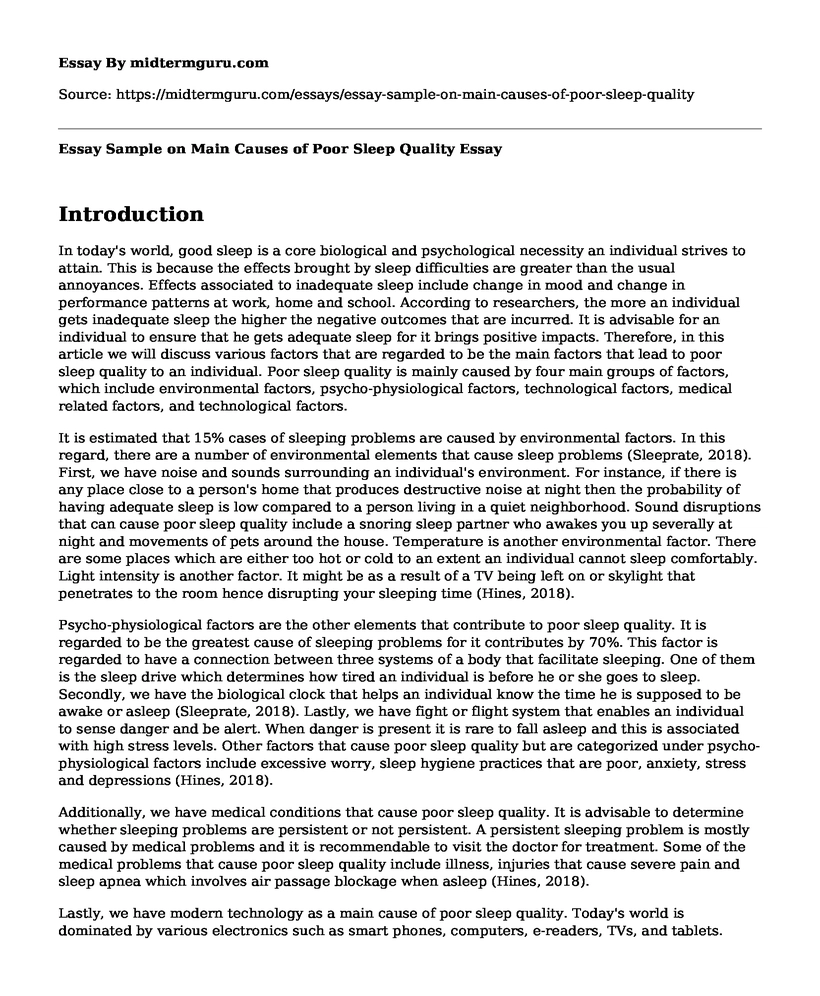Introduction
In today's world, good sleep is a core biological and psychological necessity an individual strives to attain. This is because the effects brought by sleep difficulties are greater than the usual annoyances. Effects associated to inadequate sleep include change in mood and change in performance patterns at work, home and school. According to researchers, the more an individual gets inadequate sleep the higher the negative outcomes that are incurred. It is advisable for an individual to ensure that he gets adequate sleep for it brings positive impacts. Therefore, in this article we will discuss various factors that are regarded to be the main factors that lead to poor sleep quality to an individual. Poor sleep quality is mainly caused by four main groups of factors, which include environmental factors, psycho-physiological factors, technological factors, medical related factors, and technological factors.
It is estimated that 15% cases of sleeping problems are caused by environmental factors. In this regard, there are a number of environmental elements that cause sleep problems (Sleeprate, 2018). First, we have noise and sounds surrounding an individual's environment. For instance, if there is any place close to a person's home that produces destructive noise at night then the probability of having adequate sleep is low compared to a person living in a quiet neighborhood. Sound disruptions that can cause poor sleep quality include a snoring sleep partner who awakes you up severally at night and movements of pets around the house. Temperature is another environmental factor. There are some places which are either too hot or cold to an extent an individual cannot sleep comfortably. Light intensity is another factor. It might be as a result of a TV being left on or skylight that penetrates to the room hence disrupting your sleeping time (Hines, 2018).
Psycho-physiological factors are the other elements that contribute to poor sleep quality. It is regarded to be the greatest cause of sleeping problems for it contributes by 70%. This factor is regarded to have a connection between three systems of a body that facilitate sleeping. One of them is the sleep drive which determines how tired an individual is before he or she goes to sleep. Secondly, we have the biological clock that helps an individual know the time he is supposed to be awake or asleep (Sleeprate, 2018). Lastly, we have fight or flight system that enables an individual to sense danger and be alert. When danger is present it is rare to fall asleep and this is associated with high stress levels. Other factors that cause poor sleep quality but are categorized under psycho-physiological factors include excessive worry, sleep hygiene practices that are poor, anxiety, stress and depressions (Hines, 2018).
Additionally, we have medical conditions that cause poor sleep quality. It is advisable to determine whether sleeping problems are persistent or not persistent. A persistent sleeping problem is mostly caused by medical problems and it is recommendable to visit the doctor for treatment. Some of the medical problems that cause poor sleep quality include illness, injuries that cause severe pain and sleep apnea which involves air passage blockage when asleep (Hines, 2018).
Lastly, we have modern technology as a main cause of poor sleep quality. Today's world is dominated by various electronics such as smart phones, computers, e-readers, TVs, and tablets. These devices have a blue light that is highly concentrated and hence it affects our retinas by piercing photoreceptors. This affects the melatonin hormone in our brains that regulates sleep cycles hence having poor sleeping patterns. Technology also leads to increase in anxiety and high cortisol levels, especially if an individual was replying work emails that are stressful or watching videos that are intense before bedtime. These activities trigger your mind and keep you alert due to affection of flight system in the body (Tuck, 2017).
Conclusion
In conclusion, we have discussed four factors that are regarded to be the main causes of poor sleep quality. They include environmental factors, medical problems, psycho-physiological factors and modern technological factors. Individuals should be keen on these factors to ensure that they avoid them and try to get adequate sleep. According to researchers, young teenagers are mostly affected by these factors and hence have poor sleep quality (Tuck, 2017). Effective strategies should be used to educate them on these factors and help them have adequate sleep to perfect their performances in any task.
References
Hines, J. (2018). Insomnia Facts: Symptoms, Causes, & Treatment of Poor Quality Sleep. Retrieved from https://www.alaskasleep.com/blog/insomnia-facts-symptoms-causes-treatment-poor-quality-sleep
Sleeprate. (2018). What are the main causes of poor sleep? Retrieved from https://www.sleeprate.com/causes-poor-sleep/
Tuck. (2017). From Phones to Video Games, How Tech Is Destroying Your Sleep. Retrieved from https://www.tuck.com/how-does-technology-affect-sleep/
Cite this page
Essay Sample on Main Causes of Poor Sleep Quality. (2022, Nov 01). Retrieved from https://midtermguru.com/essays/essay-sample-on-main-causes-of-poor-sleep-quality
If you are the original author of this essay and no longer wish to have it published on the midtermguru.com website, please click below to request its removal:
- Analysis and Presentation of Data in Pharmacology - Essay Sample
- The Quality and Safety Education for Nurses (QSEN) - Paper Example
- Legally, What is Quality Care? Understanding Nursing Standards - Article Review Paper Example
- Essay Sample on Distracted Walking
- The Nursing Issue to be Presented - Research Paper
- IVF vs Spontaneous Pregnancies: Leiomyoma & Complications - Research Paper
- Nurses Leverage Research to Improve Quality Care - Research Paper







